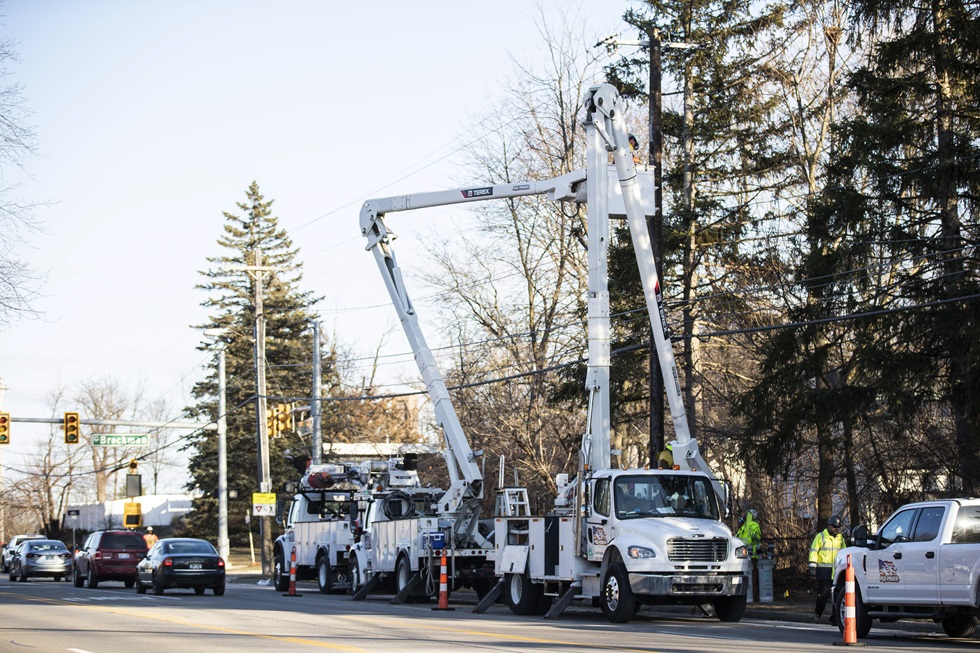
ANN ARBOR, Mich.—As the weather continues to tease an early spring, one thing that residents of Southeast Michigan constantly worry about is what has yet to come. Although it’s true that we are on the upswing of the season and nearing spring, we are not normally out of the clear when it comes to a late snow or ice storm until well into the new season. It is not so much the weather itself that leaves many residents wary, but specifically what power outages may result from it.
Indeed, the winter is quite unpredictable in Michigan; however, severe weather—which seems to have fewer bounds as to when it can occur in the Midwest—keeps residents in a state of insecurity throughout the year. Summer storms, in particular, test our power infrastructure yearly. Take August 2021’s outage, which left 850,000 without power, and August 2022’s outage, which left over 500,000 customers of the Detroit-based energy company DTE powerless, as examples.
When it comes to battling severe weather, people are always going to be on the losing side, and nothing we build will withstand nature’s most awesome forces, at least not indefinitely. So, in this futile faceoff, are we not all on the same side? Is it even possible to be in the privileged position of a “winner”? For utility companies, the answer seems to be a much easier “yes” than it is for residents.
DTE’s stock performed quite well in 2023, and forecasts for 2024 project even higher profits than last year. Just to give an idea of what those profits could look like, DTE netted $102 million in last year’s fourth quarter.
The utility company, likewise, has continued to increase rates over the last year and a half. DTE increased charges on customers by 8.8% in August 2022. Then, in February 2023, DTE requested another increase, amounting to $622 million. An additional $368 million was requested in December of last year, and now there is another rate increase slated for this coming spring.
DTE cites these increases as necessary, the only way it can pay to update infrastructure, increase reliability, develop clean energy solutions, and do more tree trimming.
“When you listen to what they’re telling their shareholders, you get the whole truth,” President and co-founder Greg Woodring of Ann Arbor for Public Power told People’s World. “In their shareholder meeting on Feb. 23, 2023—after the ice storm that year—DTE actually bragged to their shareholders about how they saved $100 million that year by focusing on tree trimming and planned to continue to defer maintenance and cut back on contractors in order to increase profit margins.”
Ann Arbor for Public Power is a grassroots organization pushing to municipalize the utility companies. According to Woodring, the City of Ann Arbor can “use the state constitution-granted right to force the sale of all electrical infrastructure within the city boundaries and run its own electric utility.”
DTE, along with Michigan’s other major utility company, Consumers Energy, has focused a lot of its advertising efforts on tree trimming as a formidable solution. DTE’s YouTube page features several videos dedicated to a “tree trimming academy.” Although trees that have not been properly maintained can and do lead to outages when branches break due to wind or heavy ice, the focus seems to conflict with DTE’s green initiatives.
“When we started this campaign, DTE was the third dirtiest major utility in the country, with 60% of the power coming from coal and 20% from fracked gas,” Woodring added. “Today, they’re the fourth dirtiest.”
Despite advertising greener efforts, DTE has largely relied on accounting tactics to move the “clean energy” needle. Even that movement, however, amounts to very little.
“They sell this program called MiGreenPower, which on its face is something that will allow people to reach something like 100% renewable power; yet, 70-80% of their power comes from fossil fuel sources,” Woodring clarified. “What the people on this program are getting are renewable energy credits.”
According to Woodring, these credits are generated every time a megawatt of clean energy is generated. However, the credit itself can be sold on a secondary market without necessarily being tied to a company working off clean energy. This kind of financial maneuvering while posturing as a green company has allowed DTE to get away with what is considered “greenwashing.”
“DTE will find these different schemes and tactics in order to convince people that they’re working toward becoming greener without actually having to make the serious investments to move off their carbon-based energy generation,” Woodring added.
“In order to decarbonize, we have to stop using carbon-based energy generation, and as long as the same amount of carbon dioxide is going into the atmosphere, we are not making any progress.”
Although it can be difficult to focus on big-picture issues like the environment when one is left without heat in the middle of winter or worried about imminent electrical fires, the two issues do have a common cause.
“People who live in Southeast Michigan don’t really need to be told this, but DTE is an extremely unreliable utility, and we have some of the worst reliability metrics in the country—by some metrics we are the second-least reliable state,” Woodring explained.
“The primary reason for that is under-investment in our infrastructure, which has led to this dual crisis in our electrical system: We are sitting on legacy technology that has detrimental effects on the environment, and this legacy infrastructure can’t stand up to the problems that are being created by it.”
Given the size of the problem, though, taking on DTE or any utility company can seem overwhelming, and as Woodring notes, DTE has “stated very clearly that they have no intention of reaching [Ann Arbor’s] goal” of being carbon neutral by 2030. There has been a precedent set for just such a situation.
“A great example of this from out of state is Boulder, Colo.,” Woodring explained. “Boulder fought a very long municipalization fight and had some legal issues that dragged it out. Despite the fact that, ultimately, Boulder didn’t succeed and settled, they actually won an 80% state-wide greenhouse gas reduction target of 2030.”
The threat of takeover still hangs over the power company in Boulder; its continuation in private hands is contingent on meeting the target. As Woodring added: “The city gets to municipalize if they don’t hit that [target]. In addition to this, they got rid of all solar caps, they had commitments to grid-hardening, significantly improving reliability for the entire state of Colorado while also significantly improving the utility’s climate plan.
“There is something to be said about just the leverage that a public power campaign puts on a utility company to improve their service.”
Even considering a new utility company in Michigan is not dreaming too big. As Woodring pointed out, “There are 42 [other utility companies] that exist in Michigan alone, and they enjoy considerably lower rates while having higher reliability.
“We need to make a change to our energy generation system, and if we are going to make that change, why would we not make it more equitable, more democratic, and more efficient,” Woodring said. “That’s what public power offers us.”
If Ann Arbor is successful in proving the concept of city-owned utilities, this could offer a roadmap for other cities to do the same; or, at the very least, get DTE to start acknowledging the problems they are causing. As the Boulder example illustrates, this is possible, and as frustration with DTE grows, alternatives are becoming a reality.
We hope you appreciated this article. At People’s World, we believe news and information should be free and accessible to all, but we need your help. Our journalism is free of corporate influence and paywalls because we are totally reader-supported. Only you, our readers and supporters, make this possible. If you enjoy reading People’s World and the stories we bring you, please support our work by donating or becoming a monthly sustainer today. Thank you!












Comments